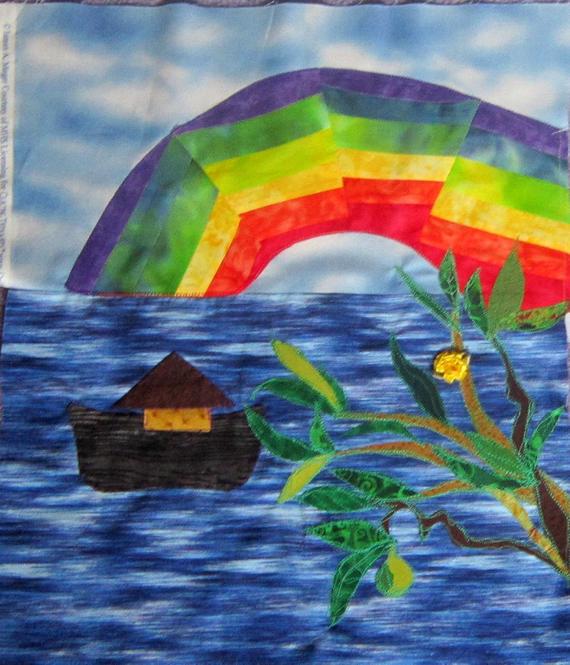From rainbow to crossThroughout the year, the Southern New England Conference of the United Church of Christ produces the Daily Lectionary for use by churches. These are the suggested readings for Thursday, March 11th: Genesis 9:8-17; Psalm 107:1-3, 17-22; and Ephesians 1:3-6. I would encourage you to read these short selections as part of your Lenten practice.
The Noah story first of all is a story. It is a myth whose purpose is not historical, but pedagogical. It is shared in faith traditions older than the Hebrew Bible. There very well may be seeds of an actual event in the story, but no more than this, definitely not a memory of the entire world flooded and destroyed except for one family and a few animals. Gradually rising sea levels that threatened a community’s known world or even catastrophic events that brought ruin quickly may lie behind the Noah story, but the importance of the story is the story. According to the story, God had tried at creation with Adam and Eve in paradise, and that did not go well. The creation experiment continues with an intellectually liberated humanity but in a struggling environment, and that did not go well. God decides to try a third time with a purer stock of a faithful man – Noah. To do this God must wipe the slate clean. God must destroy the remnants of the first two attempts at creation – thus the flood. But according to the story, it appears that God has regrets after His angry destruction of nearly all life. In the flood story prior to the Hebrew Bible, Utnapishtim offers a sacrifice to the gods after surviving the flood. What follows is not flattering: “The gods smelled the sweet odour of the sacrificial animal and gathered like flies over the sacrifice.” In other words, without sacrifices being offered on earthly altars, the indolent gods were starving. In the Genesis account, Yahweh does not need sacrifices to survive. Rather, Yahweh regrets His act of destruction, and promises instead: “‘I will never again curse the ground because of humankind, for the inclination of the human heart is evil from youth; nor will I ever again destroy every living creature as I have done.'" This change of the divine heart is sealed by the rainbow as told in today’s Genesis selection. According to the story, especially the biblical variants to the original story, God has turned away from destruction as a means of reform. God realizes that we are flawed. God will now work to morally rehabilitate creation. And the path toward the cross is laid. God has chosen to accept in Jesus human life as it is, and to transform it. The Incarnation is God’s embrace of creation not as the Creator, but as a part of it. And Jesus even faces the horrors of the cross, its destruction of life, as God’s willingness to accept that destruction upon Himself rather than to destroy again: “‘… nor will I ever again destroy every living creature as I have done.’” As we pause to meditate upon such a God, such a Saviour, let us join with the author of Ephesians and proclaim: “O give thanks to the Lord, for he is good; for his steadfast love endures forever.” If you’d like, here is the link to the Massachusetts Conference’s daily reading schedule: www.macucc.org/lectionary.
0 Comments
Leave a Reply. |
NewsFaith, love and chitchat. Categories
All
Archives
June 2024
Follow
|
|
SERVICE TIMES
Sunday 9:30-10:30am Children Sunday School 9:30-10:30am Nursery care available during worship DONATE Make a single or recurring contribution by clicking here |
FOLLOW
|

 RSS Feed
RSS Feed
